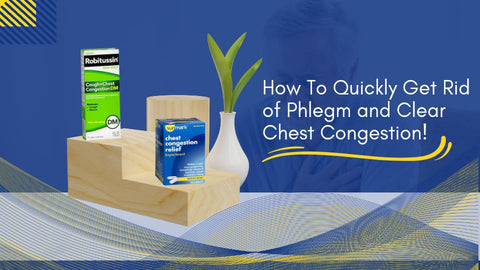
Have you been feeling congested lately and can't seem to shift that annoying phlegm from your chest? Whether you're dealing with a cold or allergies, it can be a truly uncomfortable and irritating experience. The good news is, you don't have to suffer any longer! In this article, we'll be covering everything you need to know about phlegm and chest congestion, from identifying the symptoms to exploring different treatments and remedies. So if you're ready to find out how to get rid of phlegm and clear chest congestion, let's get started!
What is Phlegm?
Put simply, phlegm is a type of mucus that is produced by the body and is generally expelled through coughing or sneezing. It is made up of water, proteins, and salts, and is produced by the mucous membranes in the nose, throat, and lungs. Phlegm is typically clear or white in color, and can range from thick and sticky to thin and watery.
When phlegm is expelled from the body, it generally means that the body is trying to get rid of any foreign particles or irritants. However, if the body produces too much phlegm, or if the phlegm is too thick, it can become trapped in the airways and cause chest congestion.
Causes of Phlegm and Chest Congestion
Phlegm and chest congestion can be caused by a variety of factors, including allergic reactions, colds and flu, respiratory infections, and smoking. Allergic reactions can cause the body to produce more mucus in order to try and flush out any irritants, while colds and flu can result in an overproduction of mucus as the body tries to fight off the virus. Similarly, respiratory infections can cause the body to make more mucus in order to try and clear the infection. Lastly, smoking can also cause the body to produce more mucus, as it is an irritant to the lungs.
Symptoms of Phlegm and Chest Congestion
The most obvious symptom of phlegm and chest congestion is a cough, which can range from dry and hacking to wet and productive. Other symptoms may include difficulty breathing, chest tightness, fatigue, and an overall feeling of being unwell. If the chest congestion is caused by a bacterial infection, you may also experience a fever, chills, and a sore throat.
Treatment Options for Phlegm and Chest Congestion
The best way to treat phlegm and chest congestion is to identify the underlying cause and then address that. If the chest congestion is caused by a virus, such as a cold or the flu, then the best course of action is to rest, drink plenty of fluids, and medications such as ibuprofen or acetaminophen to reduce fever and discomfort. Also you try Expectorant Cough Suppressant Extended Release 20 Tabs By Mucinex Dm if you experiencing severe coughing or Honey Cough + Chest Congestion Dm Liquid 4 Oz By Robitussin. If the chest congestion is caused by a bacterial infection, then a doctor may prescribe antibiotics.
Home Remedies for Getting Rid of Phlegm and Chest Congestion
Looking for a way to relieve chest congestion and phlegm? Look no further! Here are some natural, at-home remedies that can help alleviate your symptoms in no time:
- Steam inhalation: One of the most effective ways to clear mucus from your chest is by inhaling steam. Boil a pot of water, place a towel over your head, and breathe in the steam for 10-15 minutes. This can help to thin the mucus and make it easier to expel.
- Saltwater gargle: Another great remedy for chest congestion is a warm saltwater gargle. The salt can help to reduce inflammation and loosen any stuck mucus, making it easier to cough up.
- Hydrate, hydrate, hydrate: Finally, make sure to stay hydrated by drinking plenty of fluids. This will help thin the mucus and make it easier to expel.
- Chest congestion treatments: Check out our section of chest congestion products to help you get better quicker.
Natural Remedies for Phlegm and Chest Congestion
Herbal remedies can also be used to help reduce phlegm and chest congestion. Eucalyptus oil is a popular remedy, as it helps to reduce inflammation and loosen mucus. Other natural remedies include ginger, honey, garlic, and turmeric, which all have anti-inflammatory and mucus-thinning properties.
Dietary Changes to Reduce Phlegm and Chest Congestion
Making some dietary changes can also help to reduce phlegm and chest congestion. Eating plenty of fruits and vegetables, as well as reducing your intake of processed and sugary foods, can help to reduce inflammation and thin mucus. Drinking plenty of fluids, such as water, herbal teas, and soups, can also help to thin mucus and make it easier to expel.
When to See a Doctor for Phlegm and Chest Congestion
If your symptoms don't improve after trying the above treatments, or if you experience any of the following symptoms, then it is important to see a doctor:
- Persistent fever
- Chest pain
- Wheezing
- Blood in mucus
- Difficulty breathing
Conclusion
In conclusion, phlegm and chest congestion can be an uncomfortable and irritating experience, but it doesn't have to be. By identifying the underlying cause and treating it accordingly, you can get rid of phlegm and chest congestion quickly and easily. Whether you try home remedies, natural remedies, over-the-counter medications, dietary changes, or a combination of all of these, you can find relief from phlegm and chest congestion in no time. So if you're ready to start feeling better, why not give some of these treatments a try?



















Kommentare (0)
Es gibt noch keine Kommentare. Sei der Erste, der einen Beitrag schreibt!